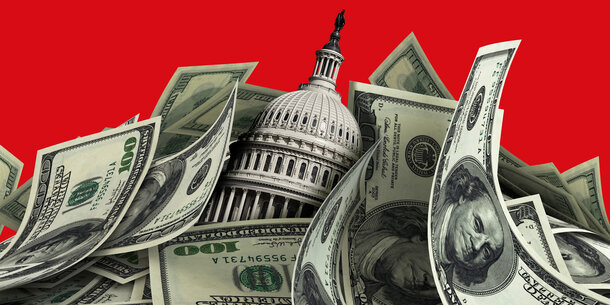Ahead of the 13th anniversary of the Supreme Court’s Citizens United decision last Saturday, Washington was rocked by two different campaign finance scandals. On the surface, Rep. George Santos (R-NY) and former FTX CEO Sam Bankman-Fried appear to have committed extraordinary and isolated incidents of misconduct. Yet their improprieties reveal the deficiencies within our campaign finance system that can be traced back — at least in part — to the Court’s problematic jurisprudence.
Santos has been dogged by scandal following revelations that he lied to voters about his background and life story. Discovery of those falsehoods has in turn led to questions about where Santos raised his campaign money, including the origin of a $705,000 personal loan he made to his campaign, after only reporting $55,000 in income in 2020.
Candidates are allowed to give or loan their campaigns unlimited sums thanks to the Supreme Court’s Buckley v. Valeo decision in 1976, which struck down most campaign spending limits. The Court reasoned that candidates have a First Amendment right to “vigorously and tirelessly” advocate for their own election. The Court doubled down on this reasoning in 2008 in Davis v. FEC, finding that even indirect burdens on self-funders were unconstitutional — in that case, a provision of McCain-Feingold that allowed their opponents to raise more money.
Because of these decisions, wealthy self-funded candidates have remained a durable feature of our political landscape. And the amount they are spending is increasing. The top 44 self-funding candidates spent a combined total of $225 million of their own funds in the last midterms, a whopping 276 percent increase from the $82 million that the top 46 self-funding candidates spent less than a decade earlier in 2014.
But what if a self-funded candidate cannot explain where their funds originated? That turns the Court’s whole rationale that self-funding carries no risk of corruption on its head. This appears to be the case with Santos, where the rapid change in his financial circumstances highlights the possibility that he may have gotten the money for his “personal” loan to his campaign from outside interests.
The source of his personal funds is far from the only question circling Santos’s campaign finances. Another big concern is his relationship with an unregistered group called RedStone Strategies, which described itself in one donor email as an “independent expenditure” group supporting Santos’s campaign. One Santos supporter purportedly sent $25,000 to the group in October, yet it remains unclear how this money was actually spent. The congressman has refused to answer questions about this group, but the New York Times reports that Santos was directly involved in at least one donor solicitation just before the election, asking a donor to contribute a few hundred thousand dollars to RedStone for an ad attacking his opponent.
RedStone’s self-description as an “independent expenditure” group suggests that it is a super PAC — a political action committee allowed to raise and spend unlimited funds thanks to Citizens United, which held that if a group operates “independently” of a candidate, it can’t be subject to contribution limits. But many groups that claim to be independent actually work hand and glove with candidates, as RedStone appears to have done.
Citizens United also assumed that all the new independent spending it greenlighted would be transparent. But 13 years later, we know that a significant portion of the spending that has resulted from Citizens United has taken the form of “dark money” from undisclosed sources — either because of legal loopholes allowing groups to avoid disclosure or due to the failure to enforce existing rules. Here, if RedStone’s sole purpose was, as it represented, to help Santos get elected, it should have registered with the FEC and disclosed its donors. But given the FEC’s notorious failures to enforce these requirements, whoever was behind the group may have reasonably concluded that compliance was unnecessary.
Dark money is also at the heart of the Bankman-Fried scandal — though not necessarily his legal woes. Bankman-Fried was recently charged with a scheme to evade campaign contribution limits by routing his contributions in other persons’ names.
But perhaps the most troubling detail in Bankman-Fried’s case was his admission of perfectly legal conduct — namely his use of donations to dark money groups to funnel campaign spending he preferred to keep secret — a common practice in federal, state, and local elections. That allowed Bankman-Fried to cultivate a public brand as a left-leaning champion while directing money to Republicans behind the scenes where it mattered for his bottom line to influence cryptocurrency regulations.
Together, the Supreme Court’s campaign finance jurisprudence, congressional gridlock, and the FEC’s inaction have created the perfect storm for people like Santos and Bankman-Fried to assume certain rules would go unenforced. In reality, there are still lines one cannot cross. But these outlandish scandals underscore how the Wild West of campaign finance breeds a culture of impunity for candidates and megadonors to leverage unfettered private wealth to shape our politics rather than invite the diversity of voices that the Citizens United majority wrongly assumed would materialize.



